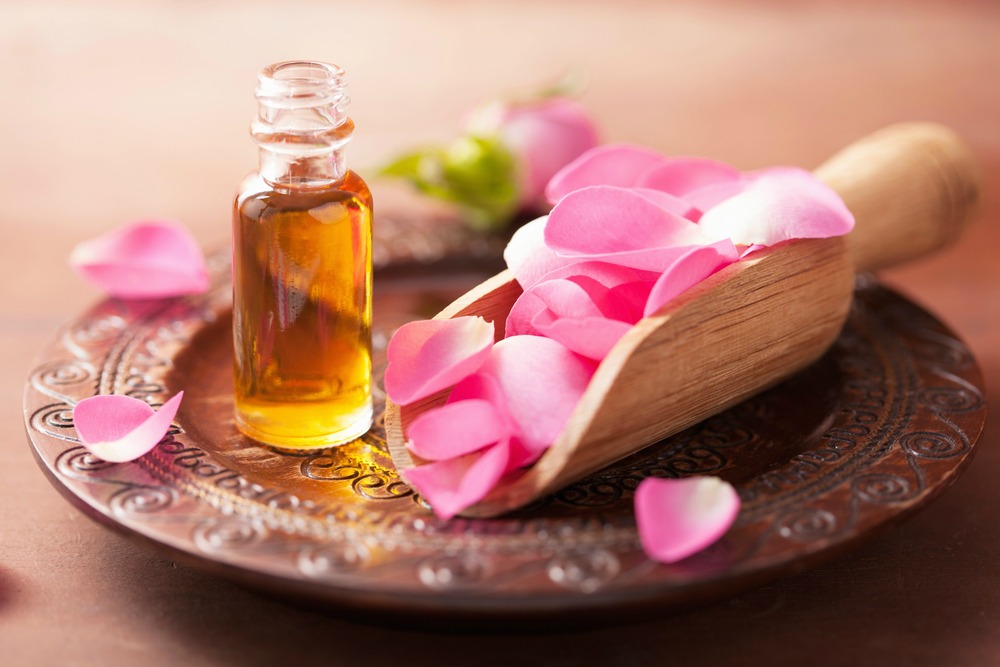Rose Oil - Aromatherapy Focus
The Beautiful Rose Oil Aromatherapy Focus
Roses are widely thought of as one of the most beautiful flowers in the world and the rose oil derived from its petals has been used throughout history in the ancient art of aromatherapy. Pure oil (Rosa Damascena) is quite hard to find due to the high cost of extraction through the steam distillation of the petals. In fact, it takes 12,000 petals to produce one single 5ml bottle of oil. You will most likely mainly come across a highly diluted oil or a rose absolute which involves a cheaper extraction process. It is very highly coveted and much loved for its familiar floral aroma and benefits.
Roses have been prized throughout history and the French were distilling rose petals for their famous rose water, of which rose oil was a by-product, pre-French Revolution. Extraction with solvents (rose absolute) was started in Bulgaria in 1904 and this method has now become widely spread. Often associated with love, the legend of the discovery of rose oil is also steeped in romance. In the reign of Barbour in 932 Princess Nour-Djiban decided to surround her gardens with canals containing rosewater for her wedding. The bridal pair rowed along the softly scented water in the sunshine and noticed a beautiful oily substance floating on the surface - rose oil.
 The Fragrance of Rose Oil
The Fragrance of Rose Oil
We are probably all familiar with the rich heavenly scent of rose oil which is why it is such a popular ingredient in perfumes. However, this is not the only use of it in the beauty industry, in fact it was used as an ingredient in one of the oldest cold cream recipes in the 2nd Century. Rose oil is wonderful for maturing skin as it reduces wrinkles, puffiness, broken capillaries and even some forms of eczemas.
As well as helping maintain healthy young skin rose oil may also assist with the repair of damage such as stretch marks and surgical scars. This is because it is a Cicatrisant which means it helps form scar tissue. This is mainly due to the antioxidant properties of rose oil which spur on the healing process.
The oil also has antibacterial, antiseptic, antiviral and astringent properties making it useful in treating and disinfecting minor cuts and injuries. The oil contains a compound called farnesol which not only helps kill bacteria but may also help with the regeneration of new skin. If you suffer from adult acne or breakouts give face products containing rose oil a try as its astringent properties help reduce the flare-ups and fight the associated bacteria. It is also generally safe for all skin types and great for people with sensitive skin.
Rose oil can also help fight the symptoms of anxiety and depression whilst boosting self-esteem and confidence. This oil has been widely used in aromatherapy ever since the years of essential oils pioneer and biochemist Marguerite Maury. Often used in massage therapy it has been found to calm the nervous system and help boost mood during times of stress and fatigue.
We often associated roses with Valentine's day and with good reason as the essential oil is also seen as an aphrodisiac. Even Cleopatra was said to bathe in rose petals to help entice her lovers. Rose oil is often used in Ayurvedic (an ancient Indian health practise) treatments to help stimulate the libido by increasing feeling of love, compassion, and devotions.
 Rose Oil Uses
Rose Oil Uses
There are many different ways to use Rose oil - the most common being through diffusing. Diffusing a few drops in the morning will help promote energy and vitality. Or apply a few drops to your face, neck and decolletage as part of your normal beauty routine and follow with your normal moisturizer. If you have problem areas on your skin - apply directly on a damp cotton wool ball twice daily. Rose oil can also benefit the limbic system so massage a small amount over the heart daily and then inhale from the hands afterwards.
You could also try mixing one drop of rose oil with two drops each of Sandalwood and Frankincense and 1oz of carrier water for a great facial serum which can be used nightly after cleansing.
A word of caution - rose oil is an Emenagogue and may stimulate blood flow to the pelvic area which means it should not be used during pregnancy. If used in excess in high concentration Rose oil may also cause headaches.
Leave a comment